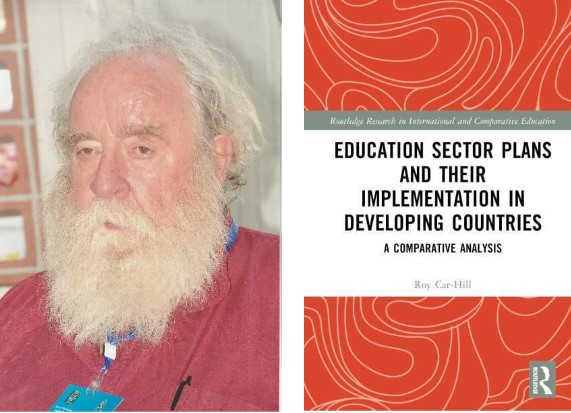
Professor Roy Carr-Hill sadly passed away on 21 November 2022. Roy was an esteemed serving colleague in the Department of Education, Policy and Society (EPS) at UCL IoE. Join this free in-person event to celebrate Roy’s life and the launch of his most recent book.
Location: UCL IOE 20 Bedford Way Room 675
The Centre for Education and International Development (CEID) invites family, colleagues, students and friends to celebrate Roy’s life and work, including his latest book, published posthumously. His book ‘Education Sector Plans and their Implementation in Developing Countries’ will be of great interest to researchers, scholars, and postgraduate students in the fields of education and international development, comparative education, and international education more broadly.
Book synopsis (by Routledge)
This book examines the factors affecting the successful implementation of Education Sector Plans in developing countries. It provides a detailed comparison that draws on data from 27 countries to offer careful research conclusions and policy recommendations.
Offering a detailed comparison of the schooling situation (e.g. availability of potable water and toilets, provision for the disabled) as well as educational outcomes (both test scores and percentages out-of-school) from the 27 countries using empirical evidence, the book examines the resources that have been invested in different education sectors, investigating the development and success of each plan. The volume uses correlation analysis to compare factors including the availability of government funding, national characteristics, ministerial decisions, influences of country and donor stakeholders, as well as district- and school-level issues. Thorough comparative analysis of the data is then demonstrated, with two measures of achievements to identify which factors can be considered as the most important in order to reach realistic policy and research conclusions.
Timely and engaging, this book will be of great interest to researchers, scholars, and postgraduate students in the field of education and international development, comparative education, and international education more broadly.
Tribute to Roy
Roy was a true polymath and a prolific academic whose work spanned criminology, statistics, health, education and social services; including important work on education in developing countries and on the funding of the National Health Service in the UK. Roy was an avowed anarchist. As a statistician, he paid great attention to the uses and abuses of statistics by governments, especially the disguising of social problems as technical problems. He was a regular contributor to the heterodox journal Radical Statistics. Much of his work served to shed light on inequalities and inequities in access to and outcomes of education and health, focusing on the conditions of the least advantaged, including populations neglected by surveys.
Born in Widnes in 1943, Roy studied mathematics as an undergraduate in Cambridge and Penology for his DPhil at Oxford. He first taught at Sussex University, followed by a stint as a researcher for the OECD in Paris for their Social Indicators of Well-Being study. Roy’s clear-thinking and outspoken views were not valued equally by all his employers and in 1978 he decided to take-up employment in Mozambique, at the time a Marxist-Leninist state. He taught statistics and educational planning at the Universdade Eduardo Mondlane in Maputo.
On returning to the UK in 1981 Roy served at the Medical Sociology Unit in Aberdeen, moving to the York Centre for Health Economics in 1984. His work in health includes studies in nutrition, HIV and AIDS and many in other areas.
Notable examples among these are his work on funding allocation for medical general practice in the UK and his trenchant criticism of the use of quality-adjusted life-years (QALY) as a metric for health funding decisions in the UK. The ‘Carr-Hill formula’ (or global sum allocation formula) was introduced in 2004 and remains in use in 2022. It is used to weight GP practice funding according to factors driving workloads including list turnover, patient age, sex and additional needs linked to illness and mortality as well as adjusting for regional cost-factors including variations in staff pay and the impact of rural location.
Roy took up his post at UCL Institute of Education 1992. His work in education includes studies of adult literacy, education among nomadic groups, decentralisation and girls’ education, among many other topics. His work on ‘counting the uncounted’ has gained particular attention in recent years in view of renewed global efforts to attain ‘universal’ access to education and skills despite the poor quality of population data in many contexts. During the 1990s and 2000’s, Roy worked on several major African education reform programmes, serving as a consultant to, for example, governments in Mozambique, Tanzania and Kenya.
Roy was a most dedicated teacher on the MA programmes taught in the Centre for Education and International Development (CEID), working with students from a range of different backgrounds, sometimes without detailed knowledge of statistics or planning. He was patient, and attentive, walking alongside students and helping them develop and enlarge their ideas. Roy was the statistician on the ESRC-funded NICK (Nutritional Improvement for children living in urban Chile and Kenya) project. At the time of his death, he was working on the ESRC funded AGEE (Accountability for Gender Equality in Education) project, engaging in participatory discussions to generate a cross-national composite indicator that could assess work done, and still to do on gender equality in education.
Roy’s work embodied his independence of thought, clarity of mind, commitment to shining a light on inequality and injustice and his indefatigable work ethic. He was a supportive, critical and humorous colleague friend and teacher.
Roy is survived by his wife Angeles, his four daughters, seven grandchildren, two brothers and their families.





